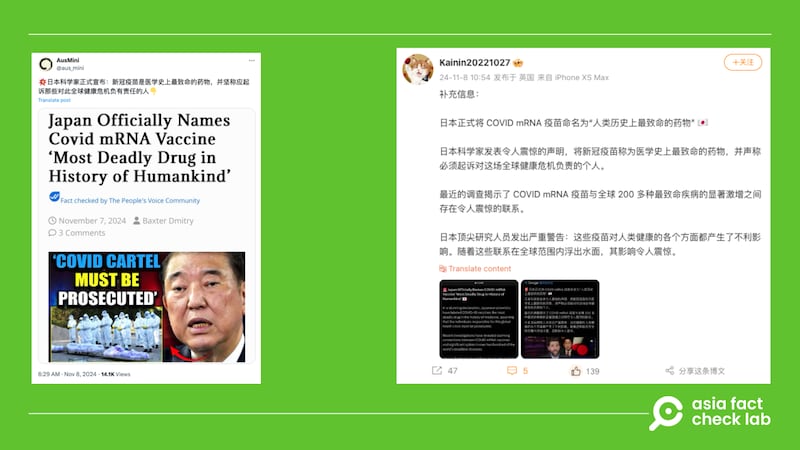A screenshot of what appears to be a news article has been shared in Chinese-language social media posts that claim Japan officially classified mRNA COVID-19 vaccines as the “deadliest drug” in history.
But the claim is false. The screenshot is from a fake news website that has spread online rumors for years. Japanese officials dismissed the claim.
The screenshot, shared on X on Nov. 8, 2024, shows what appears to be a news article. Its title reads: “Japan Officially Names Covid mRNA Vaccine ‘Most Deadly Drug in History of Humankind’.”
“Japanese scientists officially declare: COVID vaccine is the deadliest drug in the history of medicine and insist those responsible for this global health crisis ought to be prosecuted,” the X post reads.

mRNA vaccines are a type of vaccine that uses messenger RNA, or mRNA, to teach cells how to produce a protein that triggers an immune response. This immune response prepares the body to recognize and fight a virus if exposed to it.
These vaccines played a key role in controlling the COVID-19 pandemic because they were highly effective, developed quickly and could be updated for new variants.
The same screenshot alongside similar claims was shared on Weibo here and here.
But the claim is false.
Fake news website
A reverse image search found the screenshot was taken from a website called The People’s Voice.
Conspiracy Watch, a website specialized in combatting conspiracy theories, classified The People’s Voice as a “pro-Kremlin disinformation website” and a “disinformation outlet”.
“The pro-Putin website (formerly named NewsPunch.com and YourNewsWire.com) specializes in hoaxes and has published a variety false stories about the 9/11 Attacks, Pizzagate, Hillary Clinton, Justin Trudeau, Bill Gates, COVID-19, Karl Schwab and the World Economic Forum,” said Conspiracy Watch.
Stories and claims published by The People’s Voice have been debunked by many fact-checking outlets, including FactCheck.org, Politifact, and Snopes.

Keyword searches found no official statements of reports that back the claim.
An official at the Japan-Taiwan Exchange Association, the de facto embassy of Japan in Taiwan, also dismissed the claim.
“Japan’s government has not issued any such announcement,” the official told AFCL.
Japan adopted mRNA vaccines as a central component of its COVID-19 vaccination strategy. The Pfizer-BioNTech vaccine received approval in February 2021, followed by Moderna’s vaccine in May 2021.
These vaccines have been administered nationwide in Japan and the government has issued no warnings about mRNA vaccines.
Rumors about Kostaive
AFCL also found The People’s Voice cited a video of a Japanese politician to back its claim.
A reverse image search found the video shows a press conference held by Japanese legislator Ryuhei Kawada in September 2024.
At the conference, Kawada called for Japan’s government to delay the scheduled use of a new COVID-19 vaccine, Kostaive, amid rumors about the vaccine’s side effects, that it would make an infinite number of proteins in the body or its components would be transmitted to others.
Originally developed by the U.S. companies CSL and Arcturus Therapeutics, Kostaive was marketed as the world’s first “self-amplifying” mRNA vaccine, and Japan approved it on Nov. 27, 2023.
Japan’s health ministry said the rumors about the side effects of Kostaive were “unwarranted.”
Yu Chia-yi, a researcher at Taiwan’s National Institutes of Health, said Kostaive uses the virus’s natural ability to replicate for a short time in human cells. This helps produce more of the necessary proteins while requiring a smaller dose, which may also reduce side effects.
Yu explained that “vaccine shedding” can happen with certain types of vaccines, like the oral polio vaccine. These vaccines use weakened but still living viruses, which can sometimes spread through fecal-oral transmission and indirectly affect people who come into contact with the vaccine recipient.
In contrast, self-amplifying mRNA vaccines are much safer because they use defective viruses with altered or incomplete genetic material. These changes make it very unlikely for the vaccine to spread between cells.
Yu also said a scenery of Kostaive replicating endlessly is highly unrealistic, even in a controlled lab setting, let alone in the human body.
While these vaccines do briefly replicate in cells, the body’s immune system naturally eliminates them over time, he added.
Translated by Shen Ke. Edited by Taejun Kang.
Asia Fact Check Lab (AFCL) was established to counter disinformation in today’s complex media environment. We publish fact-checks, media-watches and in-depth reports that aim to sharpen and deepen our readers’ understanding of current affairs and public issues. If you like our content, you can also follow us on Facebook, Instagram and X.
